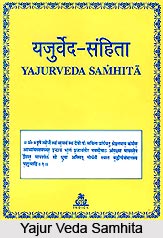 Yajur Veda Samhita explains the sacrificial rites thereby supplementing the Rig-Vedic Mantras. Yajurveda Samhita is divided into Shukla Yajurveda and Krishna Yajurveda. In Shukla Yajurveda the mantra and Brahmana portions are maintained separately. In Krishna Yajurveda the two sections are spread.
Yajur Veda Samhita explains the sacrificial rites thereby supplementing the Rig-Vedic Mantras. Yajurveda Samhita is divided into Shukla Yajurveda and Krishna Yajurveda. In Shukla Yajurveda the mantra and Brahmana portions are maintained separately. In Krishna Yajurveda the two sections are spread.
Shukla Yajurveda Samhitas are Madhyandina and Kanva. The Krishna Yajurveda Samhitas are Kathaka, Maitrayaniya, Taittiriya and Charaka. Among these Yajurveda Samhitas, the major ones are the Madhyandina and the Taittiriya.
It is believed that Sage Yajnavalkya had collected and edited the Shukla Yajurveda Samhita and it is called the Vajasneyi Samhita. Madhyandina Samhita consists of 3988 mantras which are arranged into 40 chapters. Madhyandina Samhita deal with Darsapurnamasa rites, sacrifices performed in the morning and the evenings, Soma sacrifices, Rajasuya and Vajapeya, altar construction, Sautramani rite, Ashvamedha, Purushamedha, Sarvamedha, Pitrmedha and Pravargya and Isavasya Upanishad.
Taittiriya Samhita deals with vivid descriptions of sacrifices like Agnishtoma, Jyotishtoma, Vajapeya, Rajasuya and so on. It is divided into 7 kandas which are again subdivided into 5-8 Prapathakas each. The Taittiriya Brahmana, the Taittiriya Aranyaka and the Taittiriya Upanishad are associated with Taittiriya Samhita. The contents of this Samhita are to some extent similar to the Shukla Yajurveda Samhitas.
This article is a stub. You can enrich by adding more information to it. Send your Write Up to content@indianetzone.com













